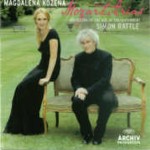The stunning Czech mezzo Magdalena Kožená reaches deep into Mozart’s women with this new recital CD and comes up with some fine music making and a couple of odd miscalculations. The disc opens and closes with Susanna: First a lovely “Deh vieni non tardar”, sung naturally and unaffectedly, with a sweet little embellished cadenza near the end, and Simon Rattle’s brisk tempos just right. And to round out the recital, she sings the showier aria that Mozart composed to replace “Deh vieni” at the August, 1789 revival, and it displays her abilities even better.
She tries her hand at all three women’s roles in Cosi, and manages to convince in each: Despina’s “In uomini…” is sassy and sung with a lightly pointed tone and spot-on high A-naturals; Fiordiligi’s “Per pieta…” may be a bit light, particularly the low notes, but it’s presented with just enough melodrama, long breaths, and simply beautiful, burnished tone; and “E amore un ladroncello” brings Dorabella’s perkiness front and center.
Other successes are Cherubino’s two arias. The first is sung with embellishments by the Italian composer, Domenico Corri, who in 1810 included it in a publication designed to guide singers in decorating their vocal lines. In fact, it creates a bastardization, altering the character of the simple lad, but Kožená sings it well; her “Non so piu…”, sung as Mozart wrote it, is the picture of young hormonal expression.
Ilia’s opening aria from Idomeneo is given an impassioned reading, each word of the recit-arioso-aria meaningful, every feeling clear. She lacks the vocal stature for the grand concert aria “Ch’io mi scordi di te”, whose low notes (strangely) give her more trouble than the high ones. (Jos van Immerseel is the excellent fortepianist.) The same might be said for Vitellia’s stupendous rondo “Non piu di fiori”, which requires a more imposing tone and strong bottom register and which Kožená just barely gets through. (The orchestra, save the basset horn, sounds scrappy in this selection as well.) On the other hand, “Alma grande e nobil core” is splendid–alive with feeling and full tone.
Accompaniments by the Orchestra of the Age of Enlightenment are occasionally sloppy, but Rattle is a sympathetic conductor. Appoggiaturas are wisely and widely added. And so, this is an oddly mixed collection. Pitch is at A=430, dropping each aria almost a half-tone, and while that saves voices at the top, it stretches the bottom into an uncomfortable realm. Or perhaps Kožená is about to become a soprano?
































